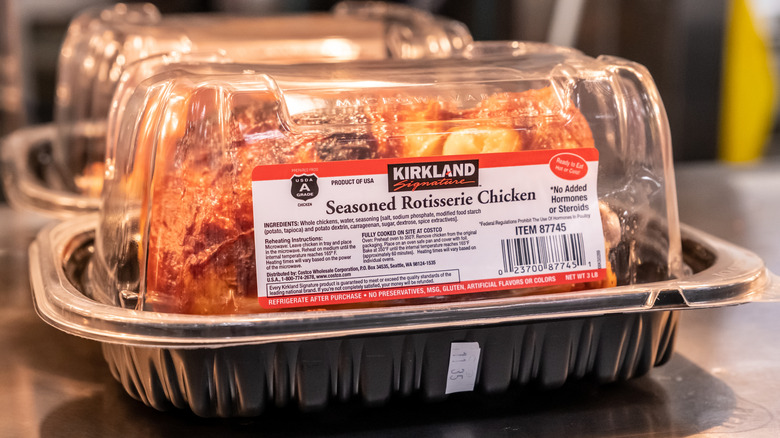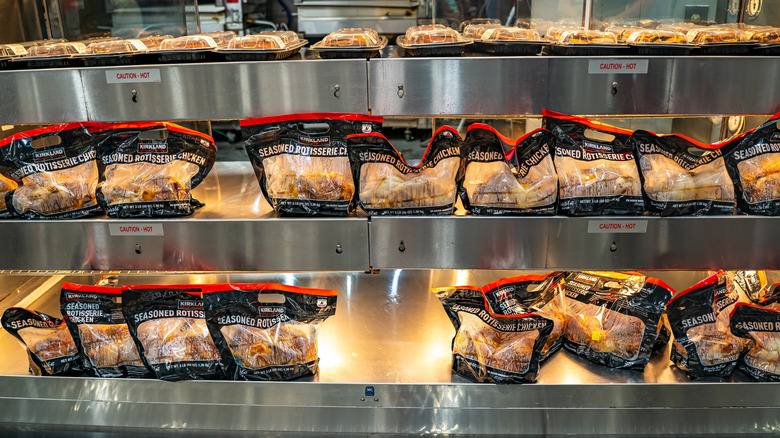Costco's Rotisserie Chicken: Is It Safe For Gluten-Free Customers?
If you live a gluten-free lifestyle, whether it's due to an intolerance, celiac disease, or personal preference, you know that gluten sneaks into lots of food and products that wouldn't obviously contain the pesky protein. Sauces, condiments, candy, and more often need to be checked before you partake to make sure there's no hidden gluten. And rotisserie chicken from the grocery store is one of those foods you have to be careful about. It's so convenient, and there are so many delicious ways to use rotisserie chicken, so you likely want to know if one of the most popular offerings — Costco's rotisserie chicken — is safe for you.
Gluten-free customers can't partake in most of the iconic Costco food court offerings. Costco's rotisserie chicken, a fan favorite among those who shop at the wholesaler, is labeled as having no gluten. In the United States, the FDA specifies that foods labeled gluten-free "must contain less than 20 parts per million (ppm) of gluten." This makes these foods safe for most people with celiac disease and gluten intolerances. However, there's a catch.
The FDA's regulations for gluten-free labeling do not apply to meat, poultry, and some egg products. Those foods are regulated by the U.S. Department of Agriculture (USDA). The Gluten Free Watchdog reports that the USDA has said multiple times that any manufacturers they manage must comply with the FDA rules if they plan to label a food gluten-free. So, more than likely, the gluten-free claim on the beloved Costco rotisserie chicken is accurate according to FDA rules. But what are actual gluten-free customers saying?
What do customers say about Costco rotisserie chicken?
A Reddit post from SusBaberhamLincoln on the r/Celiac subreddit specifically asks about the safety of Costco rotisserie chicken. Luckily, many chimed in with their experiences. Plenty of users said they ate it all the time without issue. LaLechuzaVerde wrote, "It's one of the few things I trust due to years of experience eating them and not having a reaction." Similarly, Shayliz gave a particularly convincing argument: "No reactions, and I am a sensitive celiac. We get them often! I've chatted with the [workers] making them and also didn't see strong [cross-contamination] risk there either."
Cross-contamination is a concern for many gluten-sensitive folks. Foods like rotisserie chickens, which are probably prepared in a kitchen with many other ready-made foods, harbor a risk of being handled or cooked alongside gluten-containing products to the point where they become contaminated. While the vast majority of comments in the Reddit thread spoke to the safety of Costco's rotisserie chicken for those with a gluten sensitivity, a few people wrote that they got sick from eating it.
Busquesadilla wrote, "Not safe at my Costco. It has gotten us sick several times recently after being safe for years." That could be a case of repeated cross-contamination in that particular Costco kitchen, but it's worth noting that nothing is guaranteed. It's best to consult the chefs and kitchen workers with any specific questions about the handling and cooking process of the rotisserie chicken.
Why would a rotisserie chicken have gluten?
There are numerous things to consider before buying rotisserie chicken at the grocery store, and even more if you're gluten-free. There are several ways ingredients with gluten might be used in its preparation. Some brands may use wheat flour or even breadcrumbs to keep the skin crisp. A glaze could include soy sauce, which is often not gluten-free.
As stated earlier, cross-contamination is also a pretty common concern when it comes to rotisserie chickens. They may be cooked on the same surface as gluten-containing foods, handled by cooks wearing gloves that have touched food with gluten, or stored touching those foods. So, while it's often safe to eat rotisserie chicken that is specifically labeled gluten-free, if you have further concerns, it's always okay to speak with the kitchen staff at the particular store you're buying from so they can communicate their protocols and help you make the decision for yourself.


